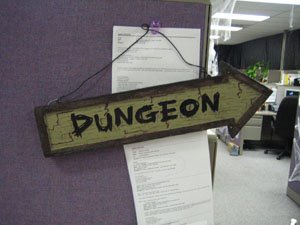
I took a few art classes in college, which were nearly impossible to get into. I had to petition, write an essay and go through two rounds of portfolio interviews because art was not my declared major and the administration didn't want "dabblers" tinkering around among the serious students who would go on to get their MFAs in oil painting or concrete sculpture. They begrudgingly let me in, though I had to win a lottery to get an actual spot. I absolutely loved those classes. But I did not change my major to art.
I tell people I didn't pursue an art and design career because my parents* ("Have you heard the term, 'starving artist'?") convinced me that I needed something stable, a field that I could rely on to pay a mortgage.** Professional art was much too unpredictable.
But the true reason I didn't consider art as a vocation is because I can't stand being around the pretentious segment of that population for more than a few minutes (does that make me pretentious?). Plus, I feared I would turn to drugs to help me come up with enough good work to compete with them (I got my best stuff by staying up so many hours in a row I was practically delirious).*
Even though I only got to take one class, the final for Life Drawing presented me with a huge life lesson. Too bad I didn't understand it for almost 15 years. The light bulb went off recently when I was trying to figure out why I can't get a handle on time management.
It's the details. The details are dragging me down.
I have always noticed things that few others do. Like spelling. And continuity. And what the extras in movies are wearing. And which television shows share the same sets. But sometimes I miss the big picture because I get hooked on the minutiae. And I'm often distracted by anything that floats by in my peripheral vision. It makes me great at Trivial Pursuit. But not awesome at effective productivity.
The final for Life Drawing was a still life set up in the middle of a circle of easels. We each took a seat and had three hours to draw what we saw. It was a bunch of stuff arranged on a table: some vases, dried flowers, I think a plate of fruit and some sort of brass instrument. I can't remember if it was a trumpet or French horn, but my eyes went directly to it.
I immediately started with the buttons on the horn. I drew each one of them painstakingly, erasing and redrawing until they were totally perfect before doing the same for the other parts of the horn. I must say those horn buttons and tubes looked almost like a photograph. I stood up, stepped back and was pretty happy. Until I looked at the clock and realized I was nearly out of time! So I started throwing down some of the other items in the arrangement. It became obvious I was going to run out of room—I had started the horn too far in the center—the composition of my piece as a whole looked terrible.
I think I got a C or D on that final. The teacher said my horn work was exquisite, but because I didn't have much else, she couldn't give me a better grade. She said I should have done a rough sketch of everything to get an idea of the entire composition (translation: MAKE A PLAN) before getting that horn nailed down so permanently. That was humbling. I knew she was right, but I had always done things this way; they had just happened to always work out in the end. I didn't win the lottery again the next semester, so that was that for art classes at university.
The other day, there was stuff lying around the living room, including several plastic bags. Instead of picking up all the random stuff to improve the overall look of the room, I decided I needed to addres the plastic bags in a big way. I pulled out the entire stash of plastic bags from under the kitchen sink and began sorting them into piles for recycle, keep and use for small garbage cans. I didn't finish that task because the baby got hungry, and left the living room with original clutter plus huge piles of plastic bags.
Why do I do this? Who knows. I've always squeaked through life using hard work and no sleep to get everything done to my specifications. But now that there is a small human who depends on us for everything, pulling an all-nighter affects more than just me.
So I have to train myself to map out the big picture before solidifying each, tiny, perfect piece and hope they all fit together. The first step to fixing a problem is admitting you have one, right?
*A semester or two before my graduation with a degree in a "stable field," my mother calls to say, "My friend at work told me about this degree—you should do it—it involves computers! What's it called? Oh yes, graphic design." When I explained that graphic design is ART, she just repeated that bit about computers.
**Three weeks into my first job out of college, the entire company was asked to take a 2.5 percent paycut to prevent layoffs. What I didn't realize was that first paycheck was the canary in the coal mine. And by coal mine, I meant sinking ship. And by sinking ship, I meant an industry where people suddenly didn't want to pay for the product anymore, so there was no money to pay people to make it anymore. It would take me another six jobs and four layoffs to realize that this career was not ever going to be steady enough to pay the mortgage.


No comments:
Post a Comment